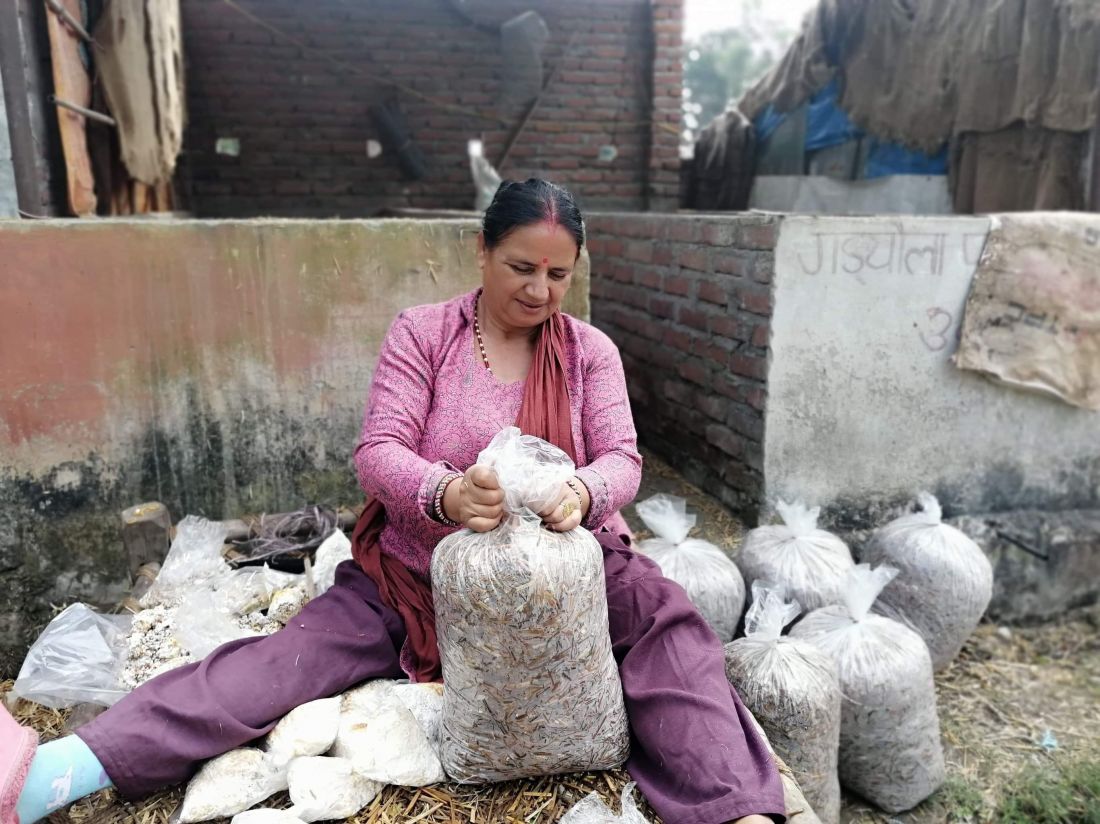Volunteer Stories

Dr. Henry Van Cotter
Nepal
Current title/profession: Visiting Scholar in Mycology at Duke University
State: NC
Organization that sent the volunteer: Catholic Relief Services
Assignment Title: Oyster Mushroom Seed Production
VOLUNTEER IMPACT
In 2007 Usha Acharya, a Nepali housewife, was riding on a motorbike with her family when a truck hit them, injuring her severely. Usha lost her leg in the accident and spent more than three months recovering in the hospital. She left the hospital with huge bills, so Usha and her husband decided to look for additional income to help raise their two children and meet her ongoing medical needs. This accident and its impact completely changed Usha’s life. They moved from Kathmandu to Dang, Lamahi, a peri-urban area, and established a small enterprise to start mushroom spawn production. Usha had grown mushroom before, but needed to move away from a heavily urban area to maximize her space and potential.
Mushroom is one of the fastest-growing sub sectors of agriculture in Nepal. Because of its quick return on investment, nutritional value, and ability to grow in small spaces, mushroom is attracting farmers in urban and rural areas. Its popularity as a “vegetable meat” among low-, and middle-income earners has expanded opportunities for small scale mushroom producers, which Usha saw as a strong opportunity. However, small scale farmers often lack knowledge of the proper techniques and technologies to develop the mother culture for quality mushroom spawn production and how to avoid contamination throughout the process.
Usha faced many of these challenges as she began her enterprise. However, Usha is a member of Uddyamsil Agricultural Multipurpose Cooperative Limited, which helps farmer members to access farm trainings, supplies, and credit services. Organizations like these are important to Nepal’s farmers, as Agriculture is Nepal's principal economic activity, employing about 65% of the population and providing 31.7% of Gross Domestic Product. The Nepal government encourages geographically suitable crops that have the potential to grow sustainably and reduce poverty, like mushroom. To better support local mushroom farmers, Uddyamsil Cooperative turned to the Farmer-to-Farmer program in search of technical training to help resolve their member’s mushroom production challenges.
Usha Archaya, participant of the F2F program, preparing straw bag for mushroom cultivation at her farm yard, Dang, Nepal (PC: Swesha Adhikari)
This USAID funded program provides technical assistance through the expertise of American volunteers, who work with small scale farmers, cooperatives, and private sector organizations. This tailor-made knowledge aims to help modernize subsistence farming and increase incomes. Uddyamsil Agricultural Multipurpose Cooperative Limited wanted F2F technical assistance to improve the quality of their mushroom spawn, which is used to cultivate new mushrooms like a seed. They sought to understand proper planting methods, how to handle existing laboratory equipment, and what additional equipment they needed to produce quality spawn.
CRS asked Henry Cotter (Dr. Van), a mushroom expert from North Carolina, to train small scale mushroom farmers in August 2019. As an active member of Uddyamsil Agricultural Multipurpose Cooperative Limited, Usha got the chance to be part of the training and to host the participants in her laboratory. Dr. Cotter taught mother culture production, contamination control, and safer use of equipment to produce good quality mushroom. Usha faces spawn contamination challenges just as other mushroom spawn producers in small scale private laboratories do. Prior to the assistance, Usha’s lab produced spawn in small quantities with comparatively inferior quality, and they limited production to one growing season.
Upon adoption of Dr. Van’s techniques on good practices, Usha learned to sterilize her spawn growing material, wheat grain, in an autoclave. She also learned to keep good inventory records, and to properly label mushroom spawn production batches. After the training, Usha developed a step-by-step flow chart for preparing mushroom spawn growing material, which makes her life easier in the lab, saving time and increasing accuracy while mixing ingredients. Now Usha’s enterprise is operating at full capacity, applying all the best practices. Usha has gained the trust and business of local small scale mushroom farmers. Before F2F volunteer Dr. Van trained on spawn production, Usha used to receive complaints from farmers on the inferior quality of the mushroom spawn, but now they buy it eagerly. She attributed the improvement to the support of F2F Nepal and Dr. Van. Now Usha is working full-time in mushroom spawn production and her daughter and husband are supporting her to expand her business even further.
Usha Achary, preparing substrate for Oyster mushroom Spawn production at her laboratory yard, Dang, Nepal (PC: Swesha Adhikari)
“Before attending training from CRS Farmer to Farmer, we faced many problems in mushroom spawn production which caused us huge financial loss. After the training we learned technical aspects of mushroom spawn production, which helps us to produce better quality and quantity of mushroom spawn that satisfy customer demands. This has taken our organization to next level,” says Usha Acharya. Uddyamasil Cooperative Manager Bisow Prakhash Adhikari agreed, stating, “Dr. Van is known as Mushroom Guru by growers.”
When Usha’s success was shared with F2F volunteer Dr. Van, he said, “I am absolutely delighted to hear that [Usha], her daughter Swesha and the other women will be featured in a CRS F2F success story. This recognition is most deserved. Swesha has kept me informed about their progress which I greatly appreciate. The amazing number of farm families to whom they have successfully provided spawn is truly remarkable. I wish them continued success!”
CRS Nepal was also very satisfied with the outcome of the assignment. “I am happy to see Farmer to Farmer transferring knowledge extensively in various aspects of agriculture development in Nepal,” said Chhan Bahadur Bhattachan, Monitoring, Evaluation, Accountability and Learning Coordinator, who has worked with the F2F program for about a decade.


